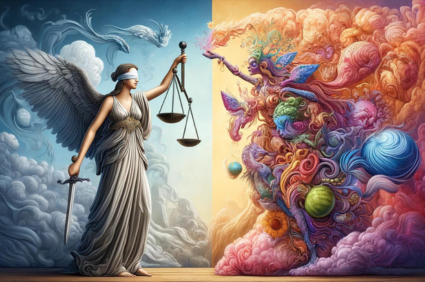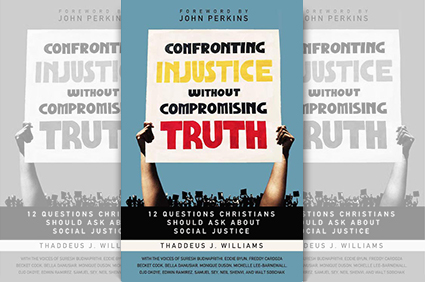Critical theory is an ideology that is rapidly growing in influence: in the social justice movement, in academia, and in the culture at large. If you’ve ever been told that men cannot make statements about the morality of abortion, or that you should never challenge someone’s ‘lived experience,’ or that you are suffering from ‘internalized oppression,’ then you’ve encountered ideas that are rooted in critical theory. In this brief essay, I’ll outline the basic tenets of critical theory and will highlight some of its strengths before arguing that it is fundamentally at odds with core Christian beliefs.
I. Defining Critical Theory
Like many broad philosophical movements, critical theory can be difficult to define. It originated with the Frankfurt school in the 1930s but has evolved considerably since then. In all its iterations, it is principally concerned with hegemonic power and how that power is wielded by dominant groups. However, rather than tracing its historical development, I find it useful to characterize modern critical theory according to its affirmation of several fundamental premises:
- Our identity as individuals is inseparable from our group identity and, in particular, whether we are members of a dominant, ‘oppressor’ group or a subordinate, ‘oppressed’ group. Example: “My schooling gave me no training in seeing myself as an oppressor… I was taught [wrongly] to see myself as an individual whose moral state depended on her individual moral will” – Peggy McIntosh, “White Privilege and Male Privilege,” in Andersen and Collins, Race, Class, and Gender, p. 72
- Oppressor groups subjugate oppressed groups by dictating and maintaining society’s norms, traditions, expectations, and ideologies. Example: “In any relationship between groups that define one another (men/women, able-bodied/disabled, young/old), the dominant group is the group that is valued more highly. Dominant groups set the norms by which the minoritized group is judged. Dominant groups have greater access to the resources of society and benefit from the existence of the inequality” (p. 25) “Hegemony refers to the control of the ideology of a society. The dominant group maintains power by imposing their ideology on everyone.” (p. 50) – Sensoy and DiAngelo, Is Everyone Really Equal?
- Our fundamental moral duty as human beings is to work for the liberation of oppressed groups. Example: “These political times call for renewed dialogue about and commitment to the politics of liberation…Liberation requires a struggle against discrimination based on race, class, gender, sexual identity, ableism and age” – Suzanne Pharr, “Reflections on Liberation,” in Adams et. al,. Readings for Diversity and Social Justice, p. 450
To these core commitments, critical theorists often add several corollaries:
- Subjective, ‘lived experience’ is more important than objective evidence and reason in understanding oppression. Example: “The idea that objectivity is best reached only through rational thought is a specifically Western and masculine way of thinking – one that we will challenge throughout this book.” – Margaret L. Andersen and Patricia Hill Collins, “Reconstructing Knowledge,” in Anderson and Collins, Race, Class, and Gender, p. 4-5
- Privileged groups promote their own agenda under the guise of objectivity. Example: “Other [non-critical] forms of thought were seen as affirmative of the existing order in spite of their self-proclaimed neutrality and objectivity… Social interests were hidden within the philosophical discourse.” Stephen Bronner, Critical Theory, p. 23
- Individuals who are part of more than one oppressed group experience ‘intersectionality;’ their oppression is qualitatively distinct from the oppression of the separate groups to which they belong. Example: “Imagine a black woman [who may be] a single working mother… She experiences, potentially, not only multiple forms of oppression but ones unique to her and to others like her.” – Delgado and Stefancic, Critical Race Theory: An Introduction, p. 59
II. The Positives of Critical Theory
Before showing the tension between critical theory and Christianity, we should try to appreciate its insights. Here, the dictum “all truth is God’s truth” is an important one. Critical theory, like any other discipline or philosophy, can help to expose blind spots where we need to bring our beliefs into conformity with the Bible. So where does critical theory reflect biblical truths?
First, critical theory recognizes that oppression is grossly immoral and ought to be opposed. This idea is perfectly compatible with the Bible. For example, the paradigmatic act of salvation in the Old Testament is Israel’s deliverance from slavery in Egypt. While a biblical understanding of ‘oppression’ can be significantly different than that of critical theory, Christians can certainly affirm that the abuse of power is a grievous evil.
Second, critical theorists insist that power corrupts; groups with institutional power will create laws, systems, norms, and even interpretations of the Bible that justify and solidify their own dominance. Again, this idea is compatible with the biblical doctrine of human depravity. Our deceitful heart will indeed twist reality and Scripture to justify its desires, so that we should be constantly wary of self-deception (Jer. 17:9).
Finally, critical theorists want to give special attention to the powerless and vulnerable. This concern is echoed by God himself (Deut. 10:18). Christians should be the very first to affirm the inherent value and dignity of all people and to give voice to those the world deems worthless or insignificant (Prov. 31:8-9).
III. Points of Conflict
Despite the positive uses of critical theory, there are many areas of substantial conflict between its tenets and a basic Christian worldview. I only have space to touch on a few of the most significant.
First, critical theory sees human relationships through the singular lens of power, which it regards as fundamentally oppressive. Yet this view is inconsistent with a Christian worldview. The relationships between parent and child, between Christ and the church, or between God and human beings involve power differentials, but need not be abusive. Therefore, to see authority as inherently exploitative is to misunderstand it. Christians are not called to be free from all authority. Instead, we are called to joyfully submit to God’s authority and to use our own authority for the good of those under it.
Second, while critical theory is right to insist that power can corrupt our perception of what is true and right, it is incorrect to assume that power is the only, or even the primary, source of such corruption. Sinful desires, which are common to all human beings, distort our perception of what is true and right. The arrogance of the oppressor can warp his perception of truth and reality, but so can the bitterness of his victim. We cannot assume that the beliefs of oppressed groups are correct solely by virtue of their oppression. Everyone’s beliefs must be tested against -and reformed to- Scripture, just as everyone’s ‘lived experience’ must be tested against -and reformed to- objective reality, a reality that is understood and contextualized by Scripture.
Third, the sharp distinction between oppressed and oppressor groups demanded by critical theory produces a flawed moral asymmetry between the two. Actions or thoughts which would be immediately identified as immoral in oppressors are seen as permissible in oppressed groups. Ridicule, disdain, and suppression of speech can be justified if they occur within the context of liberating groups from supposed oppression. Yet the Bible takes a very different view of our moral duties, because God’s law applies equally to all people, regardless of their group identity. If a thought, word, or deed is sinful in an individual from an ‘oppressor’ group, then it is also sinful in an individual from an ‘oppressed’ group (Lev. 19:15).
Finally, critical theory’s emphasis on groups over individuals as the locus of morality is incorrect. While we should not overlook the importance of community and corporate life in the Bible, we need to recognize that, in the final analysis, we will stand before the bar of God’s justice not as members of a demographic group, but as individuals.
For example, considering the question of whether children are punished for their parents’ sin in passages such as Exodus 20:5-6 and Numbers 14:18-20 among others, John Piper writes:
“The visitation of the fathers’ sins on the children is not a simple punishment of innocent children for what the fathers did. The children themselves are always thought of as sinful and rebellious as the fathers’ sin is worked out in their lives” (desiringGod.org, Feb. 1, 2000).
Similarly, in passages of corporate repentance in Daniel, Ezra, and Nehemiah, we see biblical figures confessing their individual and personal role in the ongoing sins and rebellion of their fathers. When we have not individually and personally committed the sins of our fathers, God has determined that we do not bear the guilt of our fathers (Ez. 18:2-4, 20; Deut. 24:16; Jer. 31:29-30).
Understanding the individual nature of sin and guilt is crucial to understanding why we should not accept ‘oppressor’ and ‘oppressed’ as categories into which all people can be placed by virtue of their group identity. Not all members of ‘oppressed groups’ have been personally oppressed and not all members of ‘oppressor groups’ are personally guilty of oppression. Consequently, it is biblically incorrect to assume that a particular person needs to repent of ‘oppression’ simply because they belong to a particular demographic group.
Moreover, critical theory reduces identity to group affiliation along various demographic axes such as race, class, gender, sexual orientation, able-bodiedness, and a host of other markers. While Christians should acknowledge that various demographic markers exist, we should also understand that our highest and most fundamental identity is our identity in Christ (Gal 2:20). Consequently, we should approach our fellow Christians as those who have been individually reconciled to God through Christ (2Cor. 5:17-19) and who are reconciled to one another in Christ (John 17:20-21, Col. 3:12-15). Adopting an adversarial framework in which some individuals are viewed as oppressors–not because of their behavior or beliefs but solely because of certain demographic characteristics– deeply undermines the familial love and unity that Christians are meant to display within the body of Christ.
IV. Practical Relevance
Based on the preceding discussion, we might dismiss concerns about critical theory as largely theoretical, having little relevance to our actual behavior or doctrinal beliefs. However, that is not the case. As we absorb the assumptions of critical theory, we will find that they inevitably erode core biblical truths.
Consider, for instance, the idea that we should dismantle all systems and structures that lead to power imbalances. People often embrace this view as a necessary consequence of their wholly appropriate rejection of racism. However, they fail to see its logical implications. For example, how would a commitment to dismantling systems and norms that lead to power imbalances shape one’s thinking about the role of men and women in the church? About the role of men and women in marriage? About the role of gender and sexuality in society?
What if someone asserts that abortion is the only way to prevent the burden of pregnancy from falling unequally on men and women? Should we change our views on abortion? If affirming the exclusivity of Christ in a majority Christian society marginalizes non-Christians, should we change our theology?
If these questions seem ad hoc or fanciful, it’s worth noting that critical theorists are unanimous in seeing systemic oppression and power imbalances at work in every one of these categories. To the critical theorist, traditional norms surrounding sexuality and gender are just as oppressive as those that involve race or class. Here, we see the tremendous gap between the way that the Bible and critical theory define ‘oppression.’
We should also take a careful look at the many well-known evangelical Christians who have, in recent years, followed exactly the trajectory I’m describing. More often than not, critical theory functions not just as a tool, but as a worldview. It offers us a comprehensive narrative for understanding all of reality, from our fundamental problem as human beings (oppression) to its fundamental solution (liberation). Thus, it will compete with Christianity as the governing, functional lens through which we see the world. Either Christianity will displace our commitment to critical theory, or critical theory will displace our commitment to Christianity. We can’t have both.
V. Summary
In this brief introduction, I have only scratched the surface of critical theory and its implications for Christian theology. By way of conclusion, let me offer several suggestions.
First, Christians who are opposed to critical theory as an ideology should make every effort to understand it. Yelling ‘Marxism’ whenever we hear the word ‘oppression’ or ‘privilege’ is neither irenic nor charitable. Do not shut down conversations on race or gender. Be committed to confronting and uprooting injustice, and show love and compassion to those who experience it. Be willing to listen, willing to learn, and willing to accept correction. Read primary sources by critical scholars; don’t rely on secondary sources (like this one!) as the only source of your information.
Second, Christians who are sympathetic to critical theory need to make sure they have thought through its theological implications carefully. Opposition to racism and sexism does not require the acceptance of critical theory. We dare not ‘baptize’ secular thinking under the naive assumption that it will fit seamlessly into a Christian worldview. God and His word need to be the ultimate standard by which all ideas, philosophies, doctrines, and claims are judged (2 Cor. 10:5).
Third, critical theory is an attempt to redress injustices that have been committed throughout history and which are still being committed today. This is a worthy goal, for both Christians and non-Christians. Yet critical theory is based on the flawed premise that ‘oppression’ is our fundamental problem as human beings. It isn’t. Sin is our fundamental problem. Oppressed people and their oppressors are all sinners who need forgiveness and salvation.
While Christians should absolutely work for the cause of temporal justice, we can never forget that our greatest need is the satisfaction of divine justice through the redemptive work of Jesus Christ. Let us commit to making the good news of Jesus’ life, death, and resurrection the non-negotiable center of our message. If we lose the gospel, we lose everything.
Related articles:
- Important Articles on Critical Theory
- Social justice, critical theory, and consistency
- A Long Review of Race, Class, and Gender – Part 1
- Recognizing Critical Theory – and Why It Matters
Related Podcast:
- The Dangers of Critical Theory, Reasonable Faith Podcast, William Lane Craig and Kevin Harris discuss Neil Shenvi’s work and how Critical Theory underlies the social justice movement.
Further Discussion:
Neil Shenvi has a FB group regarding this topic. This group exists to help Christians understand and engage with critical theory, an ideology based on the power dynamics between groups. Members are encouraged to post relevant articles, book reviews, and important quotes from scholars writing on critical theory.










